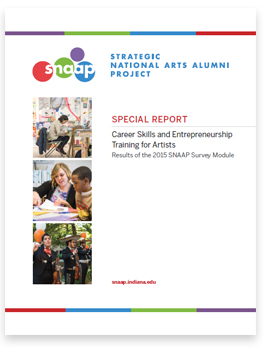"The Strategic National Arts Alumni Project (SNAAP) is an online survey, data management, and institutional improvement system designed to enhance the impact of an arts school education.1 In 2015, SNAAP developed a Topical Module with in-depth questions about arts entrepreneurship and career skills. Career skills are increasingly regarded as a crucial element of higher education, and researchers have noted the importance of such skills in assuring successful post-college career outcomes. For example, students who report using schools’ career resources are less likely to work in unskilled occupations after graduation (Arum & Roksa, 2014). Reflecting this topic’s importance, the module was selected and appended to the core SNAAP questionnaire by 50 out of 53 (94%) of the participating institutions. Over 30,000 arts alumni of all ages with undergraduate or graduate level degrees responded to the questions, creating a rich database of information. For this report, Canadian and certain other institutions were excluded from analysis due to nonstandard administrations. For this “norms” group, over 26,200 alumni from 43 institutions responded." [Introduction, p.3]
"Career skills are increasingly regarded as a crucial element of higher education, and researchers have noted the importance of such skills in assuring successful post-college career outcomes. For example, students who report using schools’ career resources are less likely to work in unskilled occupations after graduation (Arum & Roksa, 2014). Reflecting this topic’s importance, the module was selected and appended to the core SNAAP questionnaire by 50 out of 53 (94%) of the participating institutions. Over 30,000 arts alumni of all ages with undergraduate or graduate level degrees responded to the questions, creating a rich database of information." [Introduction, p.3]


Most Commented